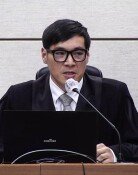More Parents Choose Home School Option
More Parents Choose Home School Option
Posted March. 25, 2006 03:10,
After his parents pulled him out of elementary school to be home schooled last December, nine-year-old Paju resident Kim Seong-hyeon recently received a strange gift: a refrigerator.
His interest in electronic products inspired his parents to purchase him a refrigerator for him to take apart and put back together.
I took it apart and put it back together over several days. Then I read a few books on refrigerators, and came to have a sense on how these machines operate, Kim said.
After being pressured by a tight daily schedule at school, Kim is now cultivating his own talent through home schooling.
Kims mother Lee Yoon-jeong (36) said, Through home schooling we came to discover our childs talent. Lee decided to teach Seong-hyeons brother, age 5, at home as well.
More households are opting for home schooling rather than sending their children to regular schools.
The Ministry of Education and Human Resources Development estimates that about 1,000 households are home schooling their children. And with 30,000 to 50,000 elementary, middle, and high school students leaving the school system each year, the number of home-schooled children is likely to increase.
Kim Myeon-hoo, age 9 and living in Yeonsu-gu, Incheon, started home schooling after quitting elementary school one and a half years ago.
Following a flexible schedule, he reads two to three science and math- related books every day. In his spare time, Myeon-hoo has been able to read thousands of books of his choice.
These days, he is immersed in swimming and piano. Every Saturday Myeon-hoo gets math tutoring at the School for the Gifted at Inha University.
Why home schooling?-
There are many reasons for parents to choose home schooling for their children. Distrust of the school system is a common reason.
Some say that while their children may be more interested in art or music, their rigid school schedule may inhibit them from developing their talents.
Some parents choose home schooling because of teachers who use violent language show favoritism toward students.
Dr. Lee Hye-young of the Korean Educational Development Institute says, Home schooling is another form of education, and we need policies that understand the diversity of educational methods. The government should accept home schooling and look into ways to provide educational resources for parents who home school their children.
Are there problems?-
After home schooling for one and a half years, homemaker Song Young-hee (43) said, There is a limit to acquiring textbooks and learning teaching methods.
Parent Lee Mi-gyeong (41) said, For a well-rounded education, our child should be exposed to a variety of educational fields, but there is a limit as to how parents can approach this.
Some also point to the lack of understanding in Korean society toward home-schooled children.
Professor Son Min-ho of Inha University said, Though the number of households with home-schooled children are few, there should be policies that protect their decisions.
Jun-Ho Cha Kum-Chun Hwang run-juno@donga.com kchwang@donga.com






![“설거지해도 그대로”…냄비 ‘무지개 얼룩’ 5분 해결법 [알쓸톡]](https://dimg.donga.com/c/138/175/90/1/wps/NEWS/IMAGE/2026/01/15/133164664.3.png)
